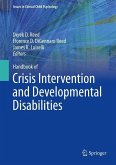Juvenile justice centers have a long tradition as an unfortunate stop for young offenders who need mental health care. Reports estimate that as many as 70% of the youth in detention centers meet criteria for mental health disorders. As juvenile justice systems once again turn their focus from confinement to rehabilitation, mental health providers have major opportunities to inform and improve both practice and policy.
The Handbook of Juvenile Forensic Psychology and Psychiatry explores these opportunities by emphasizing a developmental perspective, multifaceted assessment, and evidence-based practice in working with juvenile offenders. This comprehensive volume provides insights at virtually every intersection of mental health practice and juvenile justice, covering areas as wide-ranging as special populations, sentencing issues, educational and pharmacological interventions, family involvement, ethical issues, staff training concerns, and emerging challenges.Together, its chapters contain guidelines not only for changing the culture of detention but also preventing detention facilities from being the venue of choice in placing troubled youth.
Key issues addressed in the Handbook include:
Developmental risks for delinquency.Race and sex disparities in juvenile justice processing.Establishing standards of practice in juvenile forensic mental health assessment.Serving dually diagnosed youth in the juvenile justice system.PTSD among court-involved youth.Female juvenile offenders.Juvenile sex offenders.
The Handbook of Juvenile Forensic Psychology and Psychiatry is an essential reference for researchers, professors, allied clinicians and professionals, and policy makers across multiple fields, including child and school psychology, child and adolescent psychiatry, developmental psychology, criminology, juvenile justice, forensic psychology, neuropsychology, social work, and education.
The Handbook of Juvenile Forensic Psychology and Psychiatry explores these opportunities by emphasizing a developmental perspective, multifaceted assessment, and evidence-based practice in working with juvenile offenders. This comprehensive volume provides insights at virtually every intersection of mental health practice and juvenile justice, covering areas as wide-ranging as special populations, sentencing issues, educational and pharmacological interventions, family involvement, ethical issues, staff training concerns, and emerging challenges.Together, its chapters contain guidelines not only for changing the culture of detention but also preventing detention facilities from being the venue of choice in placing troubled youth.
Key issues addressed in the Handbook include:
Developmental risks for delinquency.Race and sex disparities in juvenile justice processing.Establishing standards of practice in juvenile forensic mental health assessment.Serving dually diagnosed youth in the juvenile justice system.PTSD among court-involved youth.Female juvenile offenders.Juvenile sex offenders.
The Handbook of Juvenile Forensic Psychology and Psychiatry is an essential reference for researchers, professors, allied clinicians and professionals, and policy makers across multiple fields, including child and school psychology, child and adolescent psychiatry, developmental psychology, criminology, juvenile justice, forensic psychology, neuropsychology, social work, and education.








